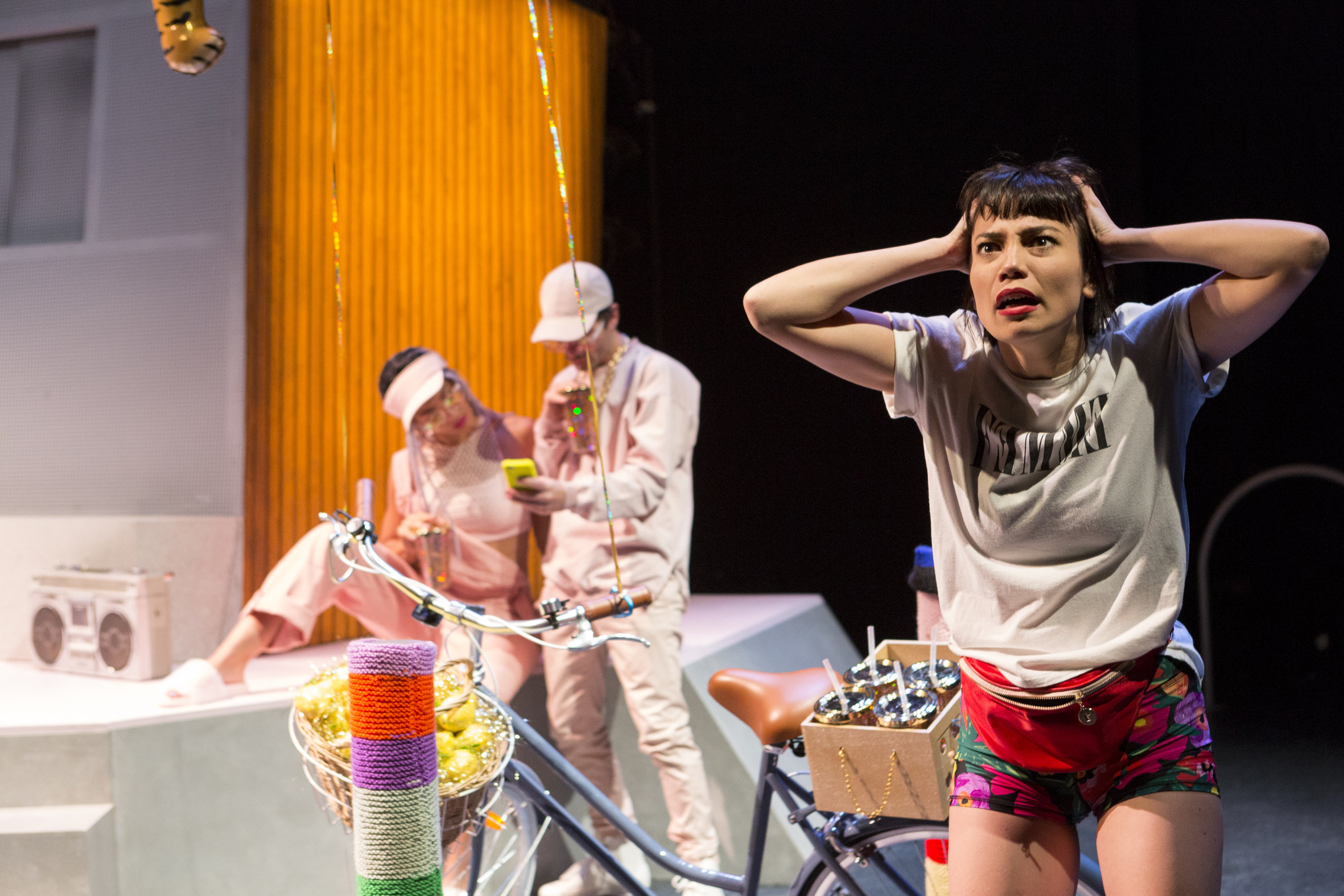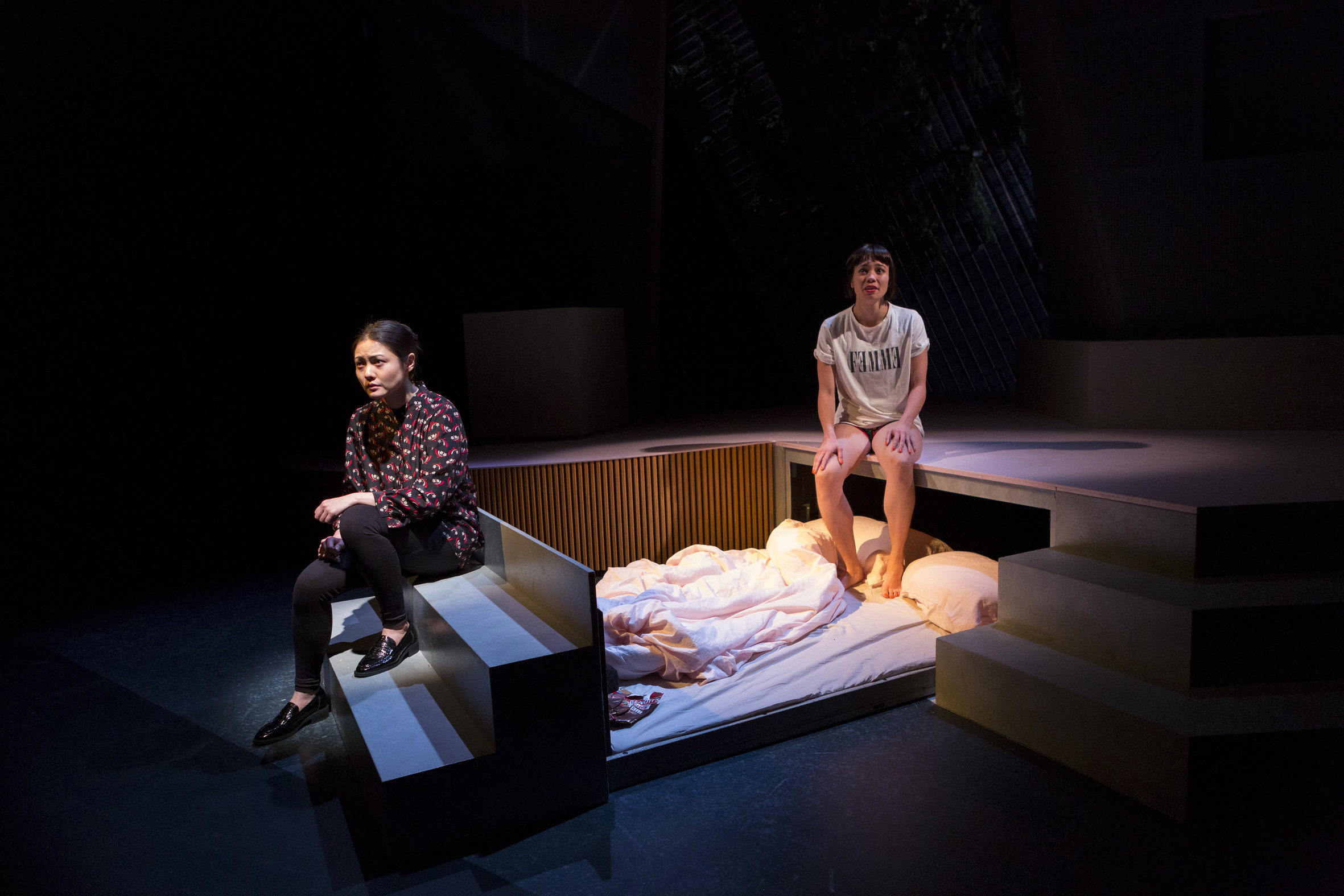Wharf 2 Theatre, Sydney
March 29, 2018
Natalie Yang is a Hmong-Australian writer with huge aspirations. Determined, passionate and fearless, she’s trying to make it by following up her first novel with a memoir. Working title: 100 Cocks in 100 Nights. And yes, she means to do what it says on the tin. Yang is also hugely insecure, self-centred and dismissive, the consequences of which dog her in Michele Lee’s Going Down, which received its world premiere last night. Lee’s is a fresh, funny voice and this is an undeniably ambitious piece of theatre. Although not without its flaws, it takes a keen look at a complex web of issues: the palatability of certain migrant stories, the corrosive self-righteousness involved in deciding who’s performing their ethnicity authentically, and the general vagaries of navigating the world as an Asian-Australian.
 Naomi Rukavina, Paul Blenheim and Catherine Davies. Photos © Brett Boardman
Naomi Rukavina, Paul Blenheim and Catherine Davies. Photos © Brett Boardman
We begin with Natalie, whose memoir Banana Girl has had a lukewarm reception. Embarking on a book tour (all the way to a public library in rural Victoria), her audience of three is horrified by the amount of sex involved. They point instead to Lu Lu Jayadi, whose memoir about her experiences as a refugee has made her a literary darling. Why doesn’t Natalie do the same? So begins her quest to reject the model migrant narrative and present the world with an in-depth look at her sex life in the form of 100 Cocks.
Catherine Davies is sublime as Natalie, turning in a highly physical performance that captures both her self-doubt and self-importance. The moment when she’s swallowed up by a lemonade-induced sugar high – it involves shoplifting a Marimekko dress, getting chummy with a tiger balloon, and generally terrorising those in Emporium – is one of the play’s most successful sequences, genuinely weird and funny. Davies gurns, leaps about the stage, and executes flips and rolls like the world’s sloppiest gymnast, a tour-de-force of tics.
The only thing that detracts from her vibrant performance is the heavy-handedness of some of Lee’s writing: Natalie’s relationship with her mother feels underwritten and not particularly interesting, either in theory or execution – instead, it feels manufactured to mine emotion and provide resolution to a play that doesn’t particularly need it. A few quiet moments could have given Davies even more room to shine – such as it is, Lee has her hit some of the same character notes over and over, to perhaps diminishing returns.
 Jenny Wu and Catherine Davies
Jenny Wu and Catherine Davies
However, hats off to director Leticia Cáceres for letting her cast of five soar: they all seemed to be having a ball on opening night (particularly inspired are the little intrusions of Melbourne street life). With everyone (bar Davies) taking on multiple roles, there was a sense of play at hand. Naomi Rukavina is particularly compelling as Natalie’s best friend Tilda, principled and inherently generous. Again, some of Lee’s tendency to go for the big effect creeps in here – a throwaway reference to Tilda’s mother possibly being alive feels incongruous and, coming as it does near the end of the play, not especially important. However, Rukavina rises above that in her performance – the moment when she quietly mops up Natalie’s face (she’s just barfed up a ricotta donut) is suffused with love and attention, a rare moment of peace that Cáceres does well to present.
Josh Price is simply hilarious, taking on a bevy of characters that represent the very best (or worst) of inner-city Melbourne. Each is distinctive, to say the least, but his worshipful Jayadi fanboy is a particular highlight: he clutches his pom-pom earrings in horror when Natalie drops Jayadi’s memoir.
 Paul Blenheim and Naomi Rukavina
Paul Blenheim and Naomi Rukavina
Paul Blenheim is utterly believable as Tilda’s on again, off again boyfriend, balancing a youthful obnoxiousness with a sense of decency. Jenny Wu’s Lu Lu Jayadi is more of a mixed bag, and that’s mostly to do with the writing – she too feels underwritten, blunting some of the impact that Lee is going for when she draws Jayadi and Natalie together at play’s end for a moment of reconciliation. Again, her impulse to provide the audience with a sense of resolution hampers the play and has the unfortunate effect of dulling its edge. But Wu does well in giving the audience fleeting glimpses of Jayadi’s self-satisfaction, and is a good foil for Davies.
With a clever set by The Sisters Hayes (the pull-out bed is effective, as is the projection of tweets and texts, rife with eggplant emoji), polished sound design (The Sweats), and lighting, Going Down has all the elements of success. It’s only undercut by an imperfect script – but in that imperfection is a daringness that one wants to see fully unleashed. Michele Lee is one to look out for.
Sydney Theatre Company’s Going Down is at Wharf 2 Theatre until May 5











Comments
Log in to join the conversation.